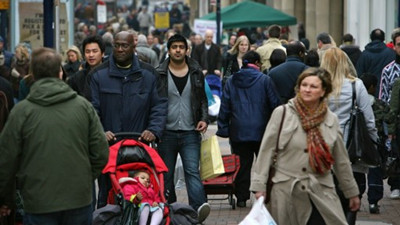官方統計
Con census
反對人口普查
Britain's decennial population count has been saved. Now make it work better
英國十年一度的人口普查被保留,如今需改良運作狀態
WHEN the first results of the 2011 census were published, almost two years ago, the most striking discovery was straightforward. Britain's population, it turned out, was around 500,000 bigger than statisticians had thought. For all that Britons are relentlessly surveyed, only a full count could reveal the size of the country, yet alone that of individual cities, towns and neighbourhoods.
約兩年前,當2011年人口普查的數據發布時,最令人吃驚的發現是十分顯而易見的。結果顯示英國人口比統計學家預計的竟多了約500,000人。鑒于所有的英國人都被調查過了,除了個別一些城市、城鎮和居民區,只有一次完整的計數能揭示這個國家真正的規模。

Given that finding, the proposal made in 2010 by an austerity-minded coalition government to scrap Britain's decennial census seemed odd. It now looks as though the census will survive after all. On March 27th the Office for National Statistics (ONS) concluded that a full population count is still necessary, though many people will in future be asked to fill in the census online. In all likelihood, the government will follow its recommendations. Academics, market researchers and social historians breathed a sigh of relief.
鑒于此發現,這一聯合政府于2010年提出的要取消英國十年一度人口普查的提議看起來有些古怪。如今看來人口普查是要被保留下來了。3月27日,國家統計局(ONS)得出的結論是盡管未來很多人將被要求在線填寫人口普查調查表,進行一次完整的人口調查仍是必要的。不出意外的話,政府將會遵循它的提議。學者、市場調研員和社會歷史學家終于松了口氣。
Scrapping the census in favour of rolling surveys of a portion of the population was always a silly idea. A full count can provide information at the level of a single street, which even very large surveys could never do. The census also supplies detailed data about poorly understood groups of people, such as some ethnic minorities. Each year billions of pounds of government spending are allocated according to estimates derived from the census. Its data determine where new schools and hospitals are built, where planning permission for housing is granted and where money is spent on transport.
取消人口普查,轉而贊成對部分人口進行滾動調查的想法是愚蠢的。一次完整的計數可以提供小至一條街的信息,這是連許多大規模調查都無法媲美的。人口普查也可為我們提供那些外界知之甚少的群體的詳細數據,如一些少數族群。政府依據人口普查得出的估算來決策每年數十億英鎊的支出應撥向何處。這一數據決定何處應建立新學校和醫院,何處應許可進行住房規劃,以及何處應加強交通建設。
The census is hardly perfect. It is expensive—the 2011 edition cost around 480m (800m). Its findings go out of date quickly. And it is increasingly difficult to conduct, as a rising proportion of people do not fill in their forms. In many European countries, including Germany and the Netherlands, the authorities use administrative data collected by public bodies in place of a traditional census.
人口普查并不十全十美。它花費高昂——2011年版成本約為4億8千萬英鎊(8億美元)。調查的結果也很快就成為了明日黃花。由于不填寫表格的人越來越多,它的可操作性也越來越難了。在很多歐洲國家,包括德國和荷蘭,行政當局選擇采用公共機構提供的管理數據以代替傳統的人口調查。
In Britain that would be tricky. The nation lacks a central population register or an identity-card system that would allow administrative data to be linked up. By northern European standards, Britain also has lots of irregular migrants who have little interaction with the state. That makes a full count unavoidable. Yet the authorities should still be investing in working out how to use administrative data better, argues Chris Skinner, a statistician at the London School of Economics. That would help to provide a check on the accuracy of census and survey data, as well as providing timelier and more precise estimates in between census years.
在英國這將比較棘手。該國缺乏一個中央人口統計處或一個身份認證系統來將管理數據統一起來。按照北歐的標準,英國也有很多幾乎不與政府來往的非正規移民。這使得完整的人口普查不可避免。然而倫敦統計學院的統計學家克里斯·斯金納表示,當局應繼續研究該如何更好地利用管理數據。這將為人口普查和數據調查的準確性把關,同時也可為兩次人口普查間的年份提供及時并更精確的估計。
The ONS agrees—and it is researching the possibility of using government data better. The trouble is that doing so will mean spending money, which is precisely what ministers wanted to stop doing when they pushed the ONS into thinking about cancelling the census. Data users will be hoping that they have a change of heart. If not, Britain might be stuck with inadequate numbers for decades to come.
國家統計局對此表示同意——它正在研究更好地利用政府數據的可能性。問題是這么做意味著要花錢,這正違背了部長們要求國家統計局取消人口普查的初衷。數據使用者們希望他們能換位思考一下。否則英國將在未來幾十年無法擺脫人口總數不準確的困境。譯者:王穎 校對:周曉青












